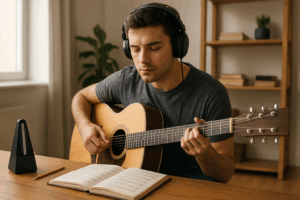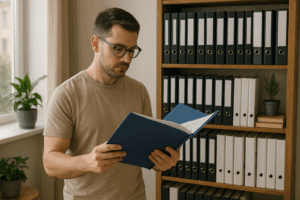Staying consistent in your music practice is one of the most important factors in becoming a skilled musician. Whether you’re a beginner or an experienced player, consistency is key to making progress, building muscle memory, and mastering new skills. In this article, we’ll explore practical tips and strategies to help you stay consistent and motivated in your music practice routine.
1. Set Clear and Achievable Goals
One of the best ways to stay consistent in your practice is by setting clear, achievable goals. When you have something specific to work toward, it’s easier to stay focused and motivated. Without goals, it’s easy to get lost in endless practice sessions without making measurable progress.
How to Set Effective Goals:
- Short-Term Goals: Start with small, attainable goals that you can achieve in a short time, such as learning a new chord, mastering a section of a song, or improving your finger technique.
- Long-Term Goals: These goals can include things like learning an entire song, performing at an event, or mastering a new style or technique. Long-term goals give you something to look forward to and help keep you on track.
Remember to break large goals into smaller, manageable steps. This will prevent you from feeling overwhelmed and will help you stay consistent over time.
2. Create a Practice Routine
Having a structured practice routine is essential for building consistency. A routine ensures that you are focusing on the right areas and helps you stay organized. When you practice without a routine, it can feel chaotic and unproductive.
How to Create an Effective Practice Routine:
- Set a Time and Place: Choose a specific time each day to practice and stick to it. Consistency is key, so try to practice at the same time each day to build the habit. Find a quiet, comfortable space where you can focus without distractions.
- Warm Up: Start each practice session with a warm-up. This could include basic exercises like scales or finger stretches to get your muscles ready for playing.
- Focus on Technique: Spend part of your practice session working on improving your technique, whether it’s hand positioning, finger strength, or rhythm.
- Work on Repertoire: Dedicate some time to learning new pieces or songs. Start with easier songs and gradually progress to more difficult ones as you improve.
- Include a Review: At the end of each practice session, review what you’ve learned. This helps reinforce the material and lets you track your progress.
Having a set routine makes your practice more purposeful and helps you stay consistent.
3. Make Practice Enjoyable
If practice feels like a chore, it’s easy to become discouraged and fall off track. One way to stay consistent is to make your practice sessions fun and engaging. When you enjoy what you’re doing, you’re more likely to stick with it.
How to Make Practice Fun:
- Play Your Favorite Songs: Incorporate songs you love into your practice routine. Playing music you enjoy can make practice feel less like a task and more like a fun activity.
- Experiment with Different Genres: Trying out new styles or genres can keep things fresh and exciting. If you usually play classical music, try learning a bit of jazz or pop.
- Challenge Yourself: Set challenges for yourself, such as playing a difficult piece without mistakes or learning a new technique. Challenges help keep your practice interesting and give you something to strive for.
By mixing things up and keeping your practice sessions enjoyable, you’ll be more motivated to practice regularly.
4. Track Your Progress
Tracking your progress is an excellent way to stay motivated and consistent. When you can see how far you’ve come, it reinforces the idea that your practice is paying off, which helps maintain your momentum.
How to Track Your Progress:
- Keep a Practice Journal: Write down what you worked on during each practice session and note any improvements. A practice journal helps you see what’s working and where you may need to focus more effort.
- Record Your Playing: Recording yourself playing allows you to listen back and hear your progress over time. You’ll notice subtle improvements that might be hard to catch in real-time.
- Celebrate Milestones: Celebrate small achievements along the way. Whether it’s mastering a challenging chord or finishing a song, acknowledging your progress can boost your motivation.
When you track your progress, you’ll feel a sense of accomplishment that keeps you consistent in your practice.
5. Find a Practice Buddy or Join a Group
Having someone to practice with can make a big difference in your consistency. A practice buddy can help keep you accountable, offer constructive feedback, and make your practice sessions more enjoyable.
How to Find a Practice Buddy:
- Take Lessons: If you’re taking lessons, your teacher can be a great source of accountability. They’ll guide your practice and give you feedback to help you improve.
- Join a Music Group or Club: Consider joining a local music group or online forum where you can share your progress, collaborate with other musicians, and stay motivated.
- Practice with Friends or Family: If you have friends or family who play music, practice together! Even if they’re not as skilled, playing music with others can keep you engaged and excited to practice.
Practicing with others can make it more enjoyable and ensure that you stay consistent in your routine.
6. Be Patient and Stay Positive
Staying consistent is not always easy, and there will be days when you feel like you’re not making progress. It’s essential to remain patient with yourself and understand that learning music is a long-term journey.
How to Stay Positive:
- Avoid Perfectionism: Don’t expect to play perfectly right away. Focus on progress, not perfection. Celebrate small improvements and be kind to yourself when you make mistakes.
- Take Breaks When Needed: It’s okay to take a break if you’re feeling frustrated or tired. Consistency doesn’t mean practicing every day without fail; it means finding a routine that works for you and sticking to it.
- Remember Why You Started: Keep reminding yourself why you started learning music in the first place. Whether it’s for fun, personal growth, or performance, reconnecting with your initial motivation can help you stay consistent.
Patience and a positive mindset are essential to staying consistent in your practice and enjoying the learning process.



